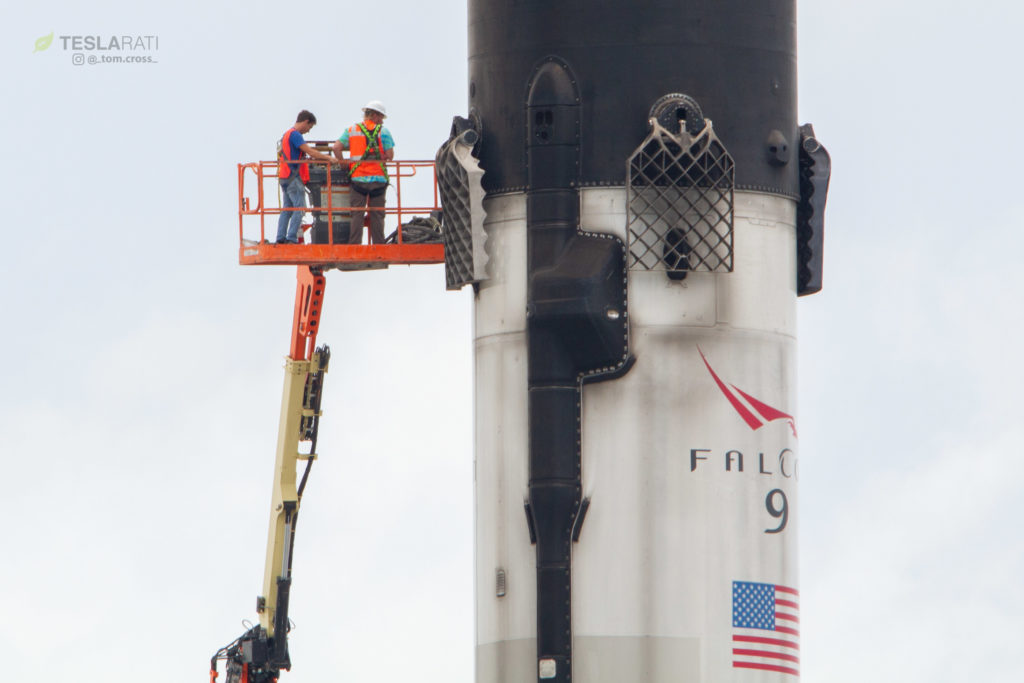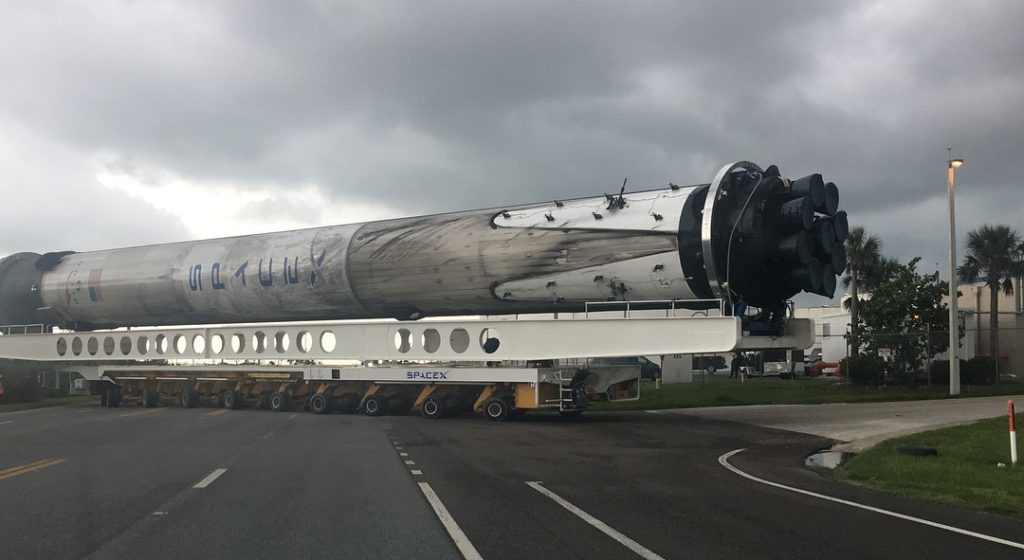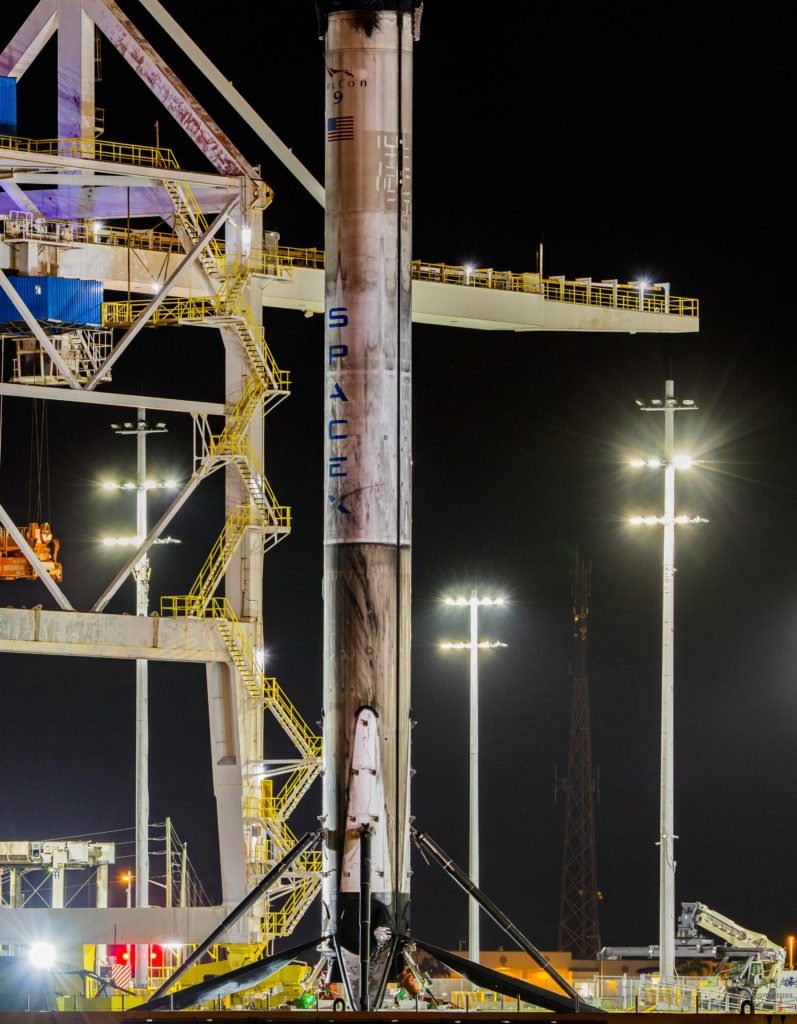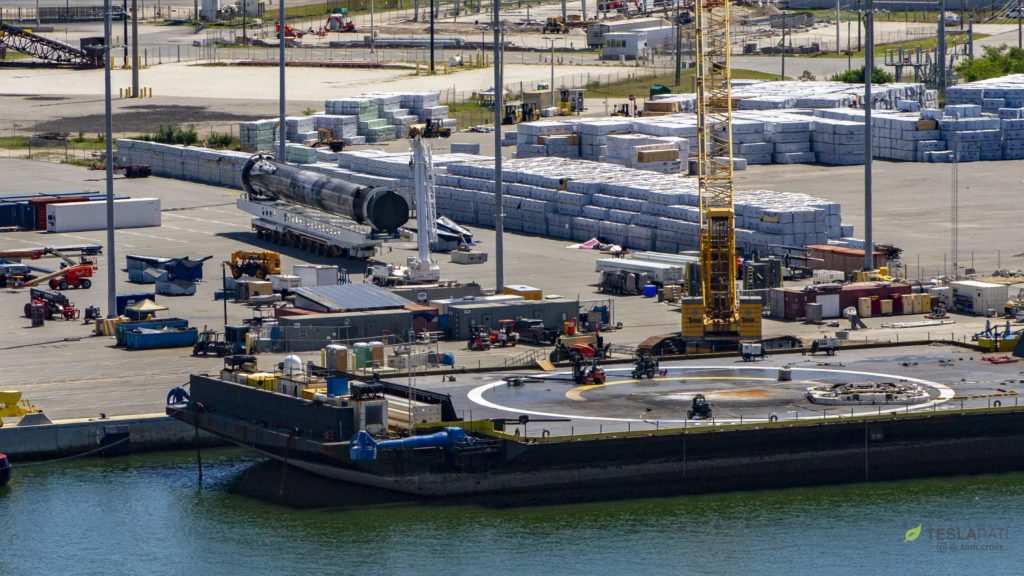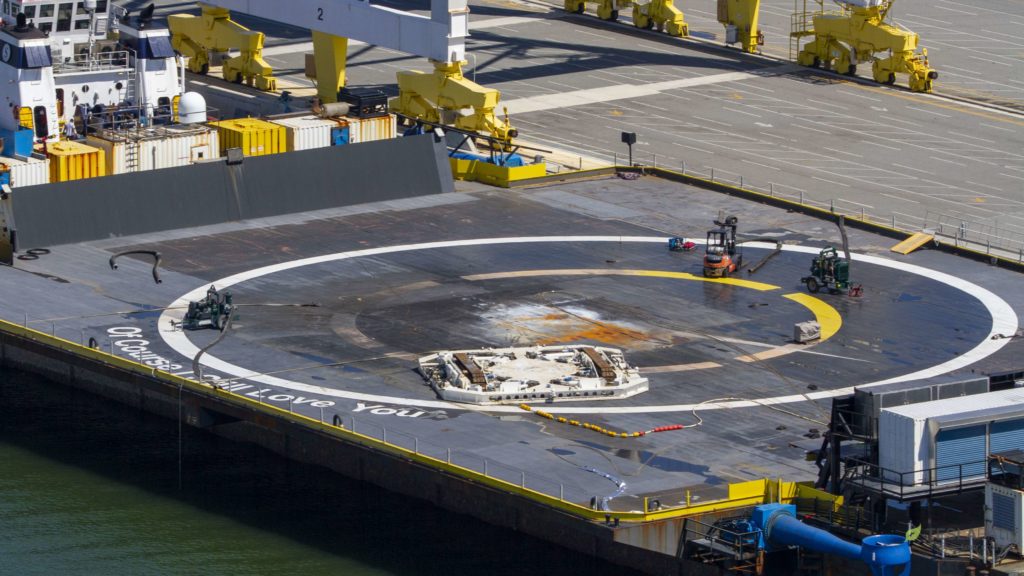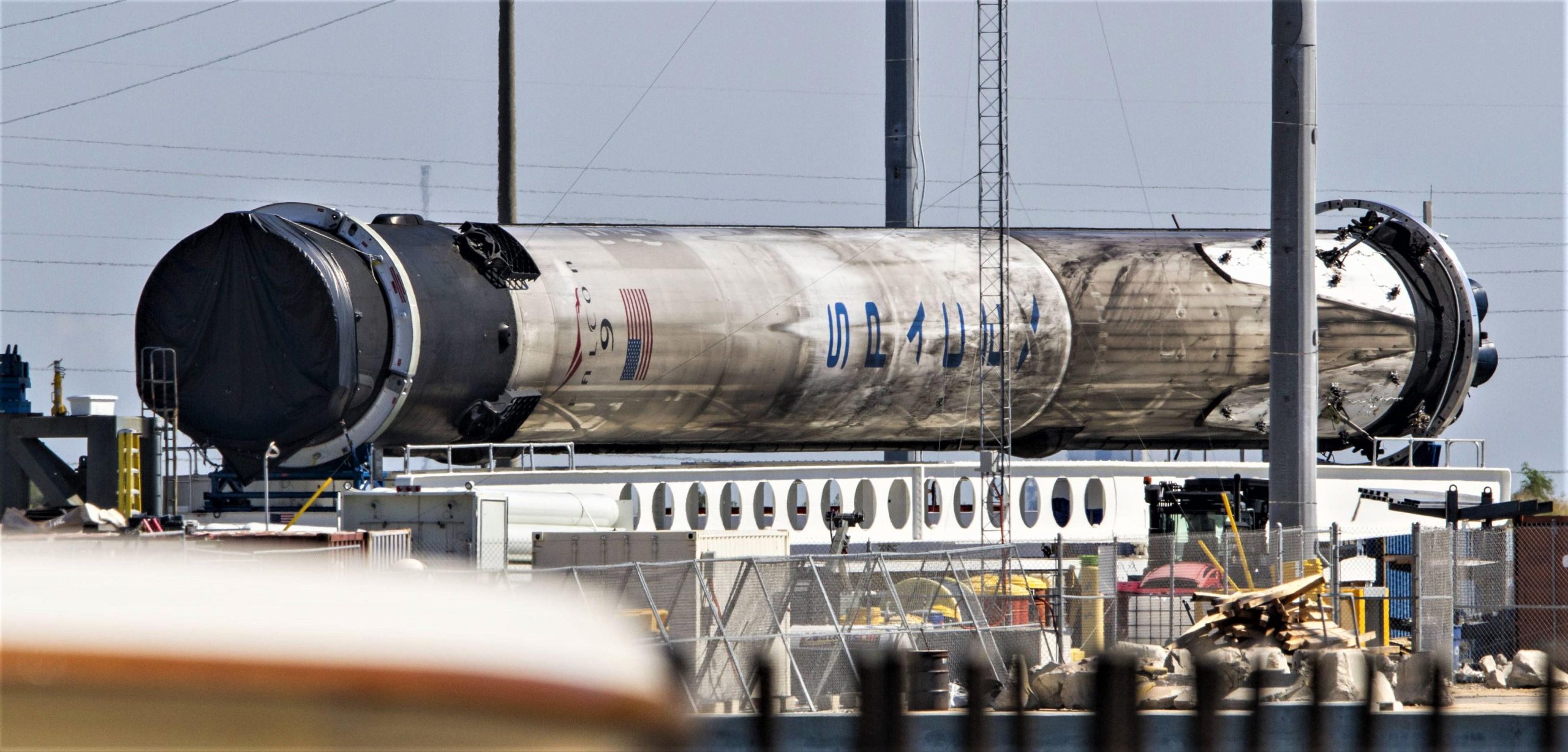
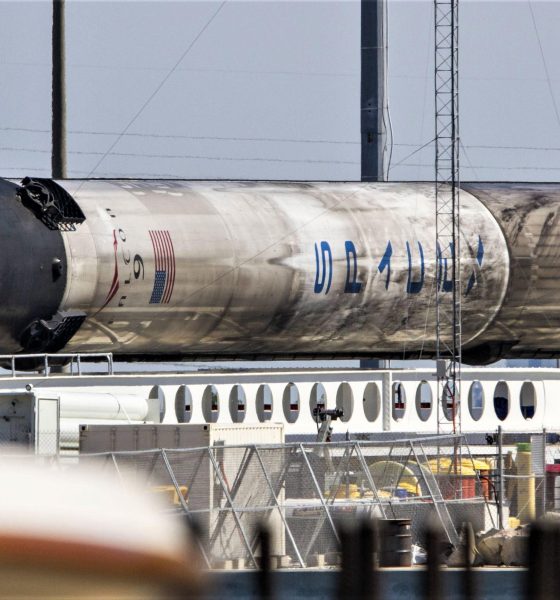
News
SpaceX’s Falcon 9 Block 5 rocket looks no worse for wear after dual launches
SpaceX’s first Falcon 9 Block 5 booster has returned to Port Canaveral, FL once again after the rocket’s second successful launch, likely the first of countless reuses to come over the next months and years. Of note, B1046.2 (Booster 1046, flight 2) was by all appearances in as good of condition as it was when it lifted off from Pad 40 just three days prior.
While it may be difficult to immediately distinguish between B1046’s second launch and recovery and those of previous, older Falcon 9 boosters, Block 5 is a quite simply an entirely different story. Moreover, the fact that SpaceX went from the major upgrade’s launch debut to first booster reflight in barely three months is an extraordinarily good indication that Block 5’s first flightworthy design (especially the parts not visible to the public) is very close to its engineers’ theoretical intentions.
Some additional shots of today's B1046.2 return to port. @SpaceX @SpaceXUpdates @elonmusk @SpaceXFleet #SpaceX pic.twitter.com/d4ivQ8PRuU
— The Aerospace Geek (@ThAerospaceGeek) August 10, 2018
Falcon 9 B1046’s second recovery also happened to be the quickest yet for SpaceX by a healthy margin, taking just 4.5 days to travel 400 miles back to port, be lifted off drone ship Of Course I Still Love You, have its legs removed, and be loaded horizontally onto SpaceX’s dedicated Cape Canaveral booster transporter. Whether or not the rocket itself is ready for another flight with absolutely zero refurbishing in between, this demonstration of just how quickly SpaceX’s infrastructure can operate indicates that much of the framework needed for truly rapid reuse is already largely in place.
Once SpaceX is confident that Block 5 can be reflown with little more than new fuel added and has lined up multiple payloads for launch in just a few days or weeks, it’s clear that the company will already have the ability to launch (and reuse rockets) so quickly that drone ship availability will become the primary bottleneck. For example, if B1046 could have shipped to one of SpaceX’s launch sites moments after it was loaded on its transporter and prepped for the second launch within 24-48 hours of going horizontal, it’s extremely unlikely that OCISLY could be readied for another booster recovery and towed several hundred miles off the coast in time to catch B1046 after its third launch.
- B1046 returned to Port Canaveral shortly after its May 4 debut, and is now being carefully analyzed as pathfinder hardware. (Tom Cross)
- Soon after, B1046 was spotted on its way to a refurbishment facility around a week after its May 11 launch debut. (Instagram /u/tersco)
- It’s currently unclear whether B1046 or B1048 will become the first SpaceX rocket to fly three times. (Tom Cross)
- 60 hours after docking, B1046 was loaded horizontally onto its transporter. (Tom Cross)
- SpaceX’s rocket-securing robot, known as Octagrabber, seen on OCISLY after another successful rocket recovery, August 12th. (Tom Cross)
As such, barring the extremely rapid completion of SpaceX’s third drone ship (named A Shortfall of Gravitas), it can be all but guaranteed that SpaceX will need to use its land-based Landing Zone 1 to accomplish CEO Elon Musk’s challenge of launching, landing, and relaunching the same Falcon 9 booster in less than 24 hours sometime before the end of 2019. Even then, it seems likely that SpaceX would either need to dramatically improve the turnaround capabilities of one of its launch sites or conduct those back-to-back launches using both of the company’s two Florida pads (LC-39A and LC-40).
Regardless, the first reuse of a Falcon 9 Block 5 booster unequivocally marks the beginning of a new era for SpaceX and for orbital rocketry worldwide. According to one of SpaceX’s webcast hosts during the second flight of B1046 (for the launch of Telkom 4/Merah Putih), the rocket’s third launch (a first for SpaceX) is already in planning for an unspecified mission later this year. As SpaceX rockets begin to rack up 3, 5, 10, or more launches apiece and the act of reusing Falcon 9s becomes so routine that it bores all but the most ardent followers, you’ll know that SpaceX has essentially succeeded in the first step of its master plan. Next stop: BFR and Mars.
For prompt updates, on-the-ground perspectives, and unique glimpses of SpaceX’s rocket recovery fleet (including fairing catcher Mr Steven) check out our brand new LaunchPad and LandingZone newsletters!

News
Tesla ships out update that brings massive change to two big features
“This change only updates the name of certain features and text in your vehicle,” the company wrote in Release Notes for the update, “and does not change the way your features behave.”

Tesla has shipped out an update for its vehicles that was caused specifically by a California lawsuit that threatened the company’s ability to sell cars because of how it named its driver assistance suite.
Tesla shipped out Software Update 2026.2.9 starting last week; we received it already, and it only brings a few minor changes, mostly related to how things are referenced.
“This change only updates the name of certain features and text in your vehicle,” the company wrote in Release Notes for the update, “and does not change the way your features behave.”
The following changes came to Tesla vehicles in the update:
- Navigate on Autopilot has now been renamed to Navigate on Autosteer
- FSD Computer has been renamed to AI Computer
Tesla faced a 30-day sales suspension in California after the state’s Department of Motor Vehicles stated the company had to come into compliance regarding the marketing of its automated driving features.
The agency confirmed on February 18 that it had taken a “corrective action” to resolve the issue. That corrective action was renaming certain parts of its ADAS.
Tesla discontinued its standalone Autopilot offering in January and ramped up the marketing of Full Self-Driving Supervised. Tesla had said on X that the issue with naming “was a ‘consumer protection’ order about the use of the term ‘Autopilot’ in a case where not one single customer came forward to say there’s a problem.”
This was a “consumer protection” order about the use of the term “Autopilot” in a case where not one single customer came forward to say there’s a problem.
Sales in California will continue uninterrupted.
— Tesla North America (@tesla_na) December 17, 2025
It is now compliant with the wishes of the California DMV, and we’re all dealing with it now.
This was the first primary dispute over the terminology of Full Self-Driving, but it has undergone some scrutiny at the federal level, as some government officials have claimed the suite has “deceptive” names. Previous Transportation Secretary Pete Buttigieg was one of those federal-level employees who had an issue with the names “Autopilot” and “Full Self-Driving.”
Tesla sued the California DMV over the ruling last week.
News
Tesla workers push back against Giga Berlin unionization
“IG Metall did not succeed in Giga Berlin‘s works council election earlier today. The union share was reduced from nearly 40% in 2024 to 31% in 2026! This is a clear message by the Giga Berlin team towards an independent co-determination! The list called Giga United, led by the current chairwoman, Michaela Schmitz, received the most votes with more than 40%! Good news for Giga Berlin!”

Tesla workers pushed back against unionization efforts at Gigafactory Berlin, and over the past few years, there has been a dramatic decrease in interest to unionize at the German plant.
Gigafactory Berlin Plant Manager André Thierig announced on Wednesday that IG Metall, the European union group, saw its share reduce from 40 to 31 percent in 2026 as employees eligible to vote on the issue. Instead, the Giga Berlin team, known as Giga United, received the most votes with more than 40 percent.
BREAKING! 🚨
IG Metall did not succeed in Giga Berlin‘s works council election earlier today. The union share was reduced from nearly 40% in 2024 to 31% in 2026!
This is a clear message by theGiga Berlin team towards an independent co-determination!
The list called Giga…
— André Thierig (@AndrThie) March 4, 2026
Thierig gave specific details in a post on X:
“IG Metall did not succeed in Giga Berlin‘s works council election earlier today. The union share was reduced from nearly 40% in 2024 to 31% in 2026! This is a clear message by the Giga Berlin team towards an independent co-determination! The list called Giga United, led by the current chairwoman, Michaela Schmitz, received the most votes with more than 40%! Good news for Giga Berlin!”
There were over 10,700 total employees who were eligible to vote, with 87 percent of them turning out to cast what they wanted. There were three key outcomes: Giga United, IG Metall, and other notable groups, with the most popular being the Polish Initiative.
The 37-seat council remains dominated by non-unionized representatives, preserving Giga Berlin as Germany’s only major auto plant without a collective bargaining agreement.
Thierig and Tesla framed the outcome as employee support for an “independent, flexible, and unbureaucratic” future, enabling acceleration on projects like potential expansions or new models. IG Metall expressed disappointment, accusing management of intimidation tactics and an “unfair” campaign.
The first election of this nature happened back in 2022. In 2024, IG Metall emerged as the largest single faction with 39.4 percent, but non-union lists coalesced for a majority.
But this year was different. There was some extra tension at Giga Berlin this year, as just two weeks ago, an IG Metall rep was accused by Tesla of secretly recording a council meeting. The group countersued for defamation.
Tesla Giga Berlin plant manager faces defamation probe after IG Metall union complaint
This result from the 2026 vote reinforced Tesla’s model of direct employee-management alignment over traditional German union structures, amid ongoing debates about working conditions. IG Metall views it as a setback but continues advocacy. Tesla sees it as validation of its approach in a competitive EV market.
This outcome may influence future labor dynamics at Giga Berlin, including any revival of expansion plans or product lines, which Musk has talked about recently.
News
SpaceX President Gwynne Shotwell details xAI power pledge at White House event
The commitment was announced during an event with United States President Donald Trump.

SpaceX President Gwynne Shotwell stated that xAI will develop 1.2 gigawatts of power at its Memphis-area AI supercomputer site as part of the White House’s new “Ratepayer Protection Pledge.”
The commitment was announced during an event with United States President Donald Trump.
During the White House event, Shotwell stated that xAI’s AI data center near Memphis would include a major energy installation designed to support the facility’s power needs.
“As you know, xAI builds huge supercomputers and data centers and we build them fast. Currently, we’re building one on the Tennessee-Mississippi state line. As part of today’s commitment, we will take extensive additional steps to continue to reduce the costs of electricity for our neighbors…
“xAI will therefore commit to develop 1.2 GW of power as our supercomputer’s primary power source. That will be for every additional data center as well. We will expand what is already the largest global Megapack power installation in the world,” Shotwell said.
She added that the system would provide significant backup power capacity.
“The installation will provide enough backup power to power the city of Memphis, and more than sufficient energy to power the town of Southaven, Mississippi where the data center resides. We will build new substations and invest in electrical infrastructure to provide stability to the area’s grid.”
Shotwell also noted that xAI will be supporting the area’s water supply as well.
“We haven’t talked about it yet, but this is actually quite important. We will build state-of-the-art water recycling plants that will protect approximately 4.7 billion gallons of water from the Memphis aquifer each year. And we will employ thousands of American workers from around the city of Memphis on both sides of the TN-MS border,” she noted.
The Ratepayer Protection Pledge was introduced as part of the federal government’s effort to address concerns about rising electricity costs tied to large AI data centers, as noted in an Insider report. Under the agreement, companies developing major AI infrastructure projects committed to covering their own power generation needs and avoiding additional costs for local ratepayers.
